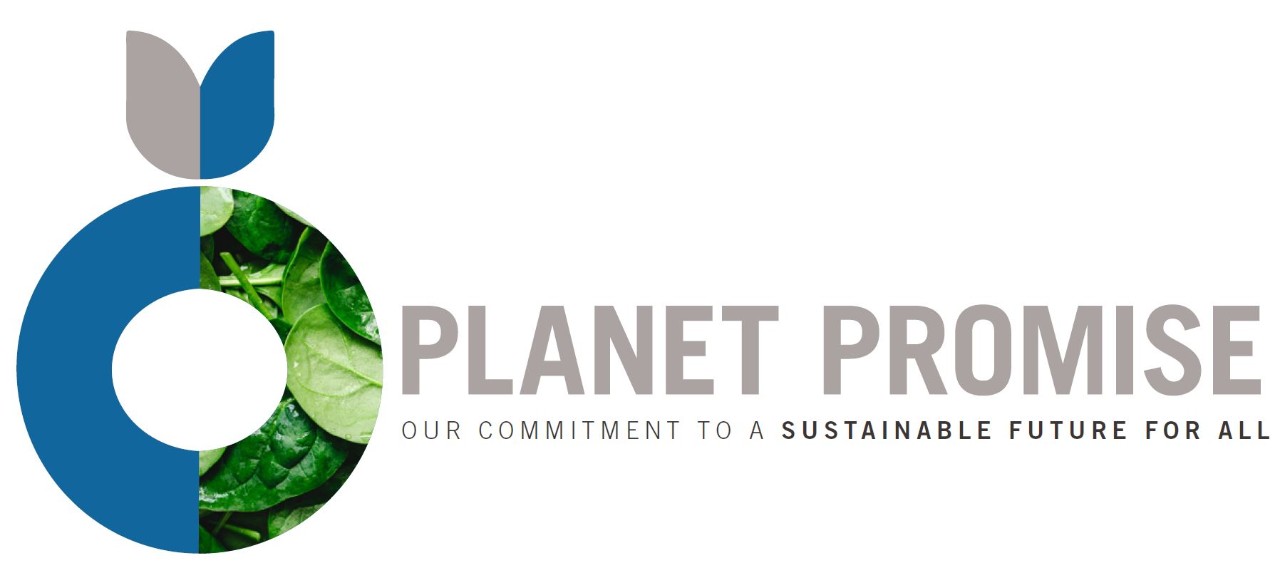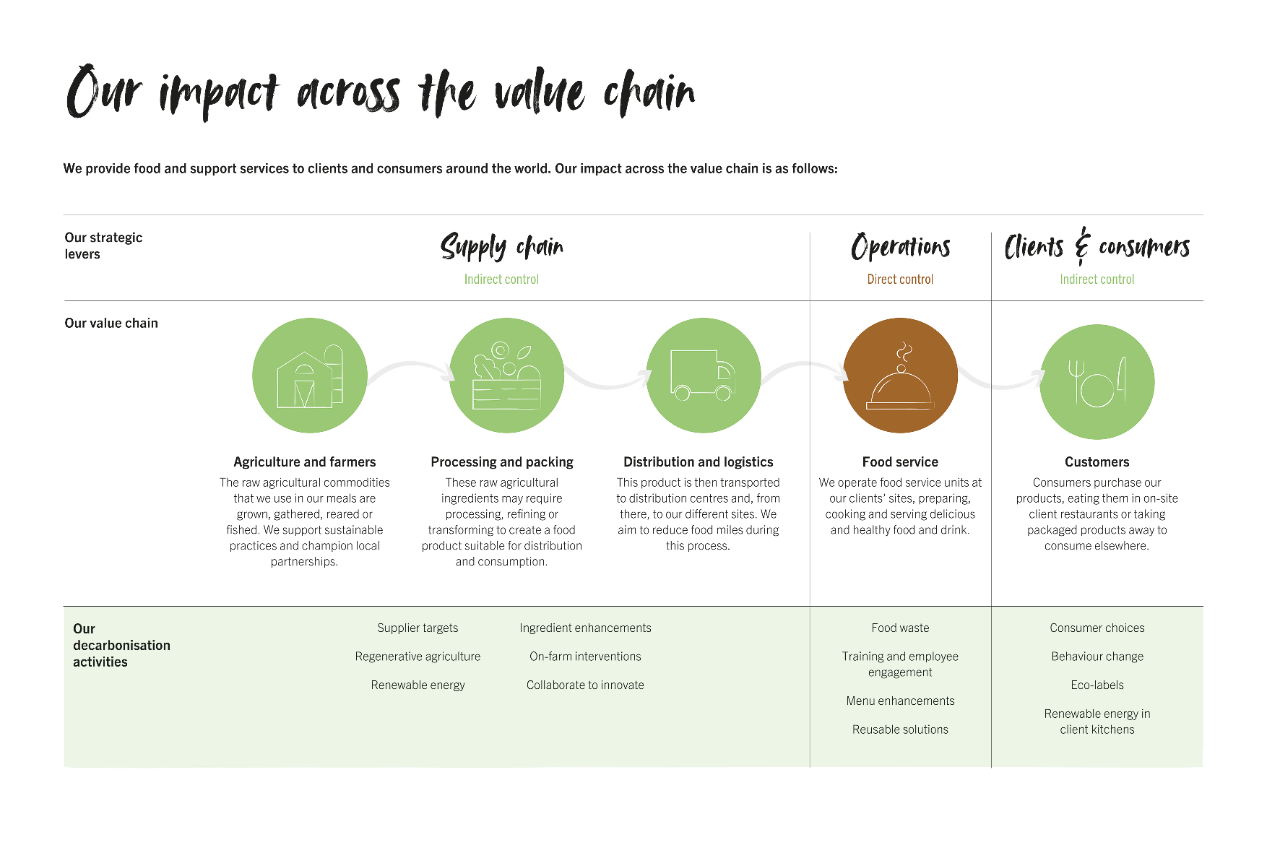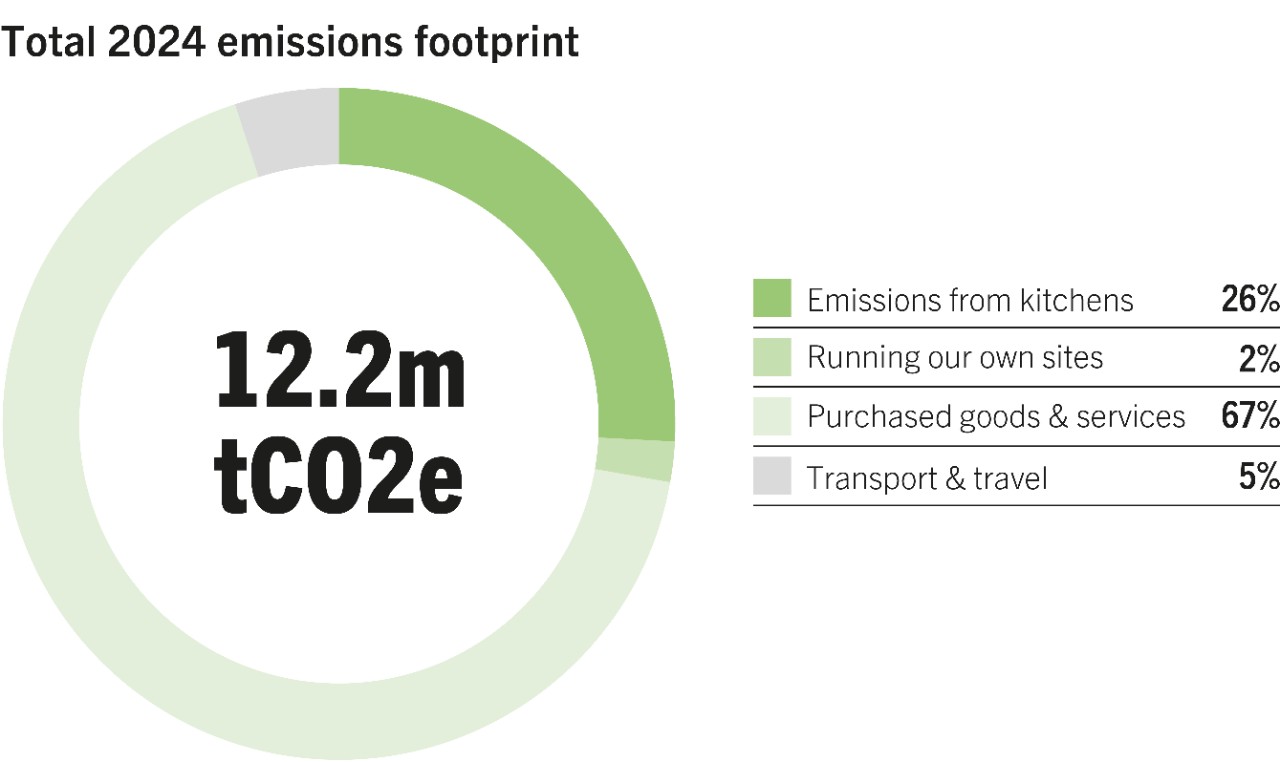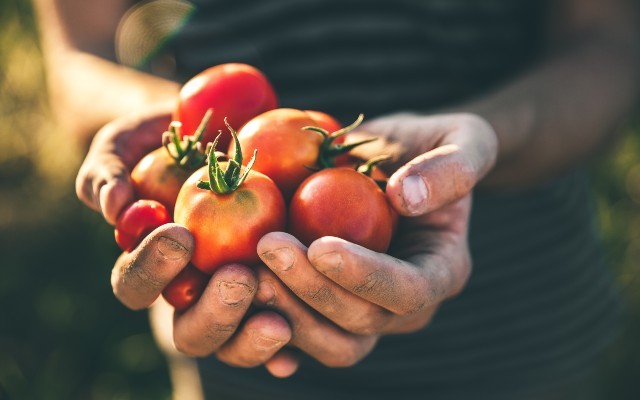Our Planet Promise is Compass Group’s global commitment to a sustainable future for all.
It encompasses our values as an ethical, sustainable and inclusive business; the commitments we make to our people, our clients and our suppliers; and our mission to have a positive impact on the world through sourcing responsibly, enriching lives and collaborating for global change.

Climate Net Zero by 2050
The international food industry has a major role to play in reaching Net Zero and we are committed to playing our part in driving the transition to a healthy and sustainable global food system.
That’s why we became the first foodservice company to commit to reaching Climate Net Zero greenhouse gas (GHG) emissions across our global operations and value chain by 2050.
We partner with leading climate consultants to continue to develop our Global Net Zero strategy. Our strategy includes ambitious carbon emissions reduction targets over the next decade to 2030, and to 2050, which have been validated by the Science Based Targets initiative (SBTi).
Our Global Commitments
Climate Net Zero greenhouse gas emissions across our global value chain by 2050.
Scope 1 & 2:
- 46% reduction in our absolute Scope 1 and 2 GHG emissions by 2030, from a 2019 base year
- FLAG - commitment to reduce Scope 3 FLAG GHG emissions 33.3% by 2030, from a 2019 base year
- Non FLAG - 28% reduction in our absolute Scope 3 GHG emissions from all food and drink purchased by 2030, from a 2019 base year
Case Studies
Climate Transition Plan
Compass Group UK & Ireland’s first transition plan was published in February 2024, showcasing what it takes to decarbonise a multi-billion business, in a period of continued high growth. The plan draws on the largest food and drinks carbon impact assessment undertaken and openly shared by any food service provider to date. We are the first in our sector to share a detailed transition plan aligned to the UK government’s Final Disclosure Framework, following its recent release by the Transition Plan Taskforce (TPT). The Framework is intended to help companies develop and deliver ‘gold standard’ climate transition plans.
Compass Group UK & Ireland has reported an absolute reduction in emissions of -9.4% across Scope 1,2,3 (FY19 baseline – FY23). This has been achieved, inclusive of the company’s high organic growth, acquisitions and joint ventures. By including Compass’ growth within its analysis, an estimated -25% reduction in carbon intensity has been calculated. Along the way our team has worked with our Chief Climate and Sustainability Advisor, Professor Sir Charles Godfray to shape and implement climate related goals.
Climate Smart Chef Training
Chefs play a key role in enabling a responsible diet and finding new solutions. Chefs across our EME region took part in the LIFE Climate Smart Chefs training in March 2024, which promotes responsible diets through the food we are serving.
During the training, our chefs received the latest insight and skills to bring home and apply to their business and clients. The goal of the Life Climate Smart Chefs project is to contribute to the development and implementation of the EU's climate policy and the Farm to Fork (F2F) strategy, by actively involving chefs as promoters of low-emission, nutritious and affordable diets that reduce environmental impact, improve public health and combat food waste.
In total, Compass chefs from nine different European countries attended the course, and we plan on continuing this training over the years.
Canteen Warehouse Goes Carbon Neutral
In the US, Canteen’s warehouse operations present the most significant opportunity for the sector to deliver carbon reductions. Canteen began piloting a sustainability programme at a San Francisco Bay area branch in 2022 and achieved carbon neutral certification for scopes 1 & 2 emissions in May 2023 as verified by SCS Global Services, a leader in third-party sustainability verification. Key initiatives delivered included updated warehouse refrigerators and freezers, implementing a new waste management process resulting in 96% waste diversion, delivering a 100% renewable energy mix, eliminating scope 2 emissions, and investing in 10 electric-powered, refrigerated trucks.
Sustainability Dashboard
Compass Group Denmark created a customised sustainability dashboard which has been implemented for 50 clients throughout 2022. It presents valuable sustainability insights such as CO2 emissions, seasonal, organic and local produce trends, as well as food waste data to clients. This data-driven technology gives us access to information on pertinent environmental criteria, helping us minimise energy, water, and waste in our kitchens and allowing us to reformulate our menus with the planet in mind.
Take a look at our interactive example.
Frequently Asked Questions (FAQ)
COMPASS GROUP'S COMMITMENT TO CLIMATE NET ZERO BY 2050
Compass Group announced a commitment to reach Climate Net Zero greenhouse gas (GHG) emissions across our global operations and value chain by 2050.
Our commitment includes ambitious emissions reduction targets over the next decade which have been validated by the Science Based Targets initiative (SBTi), and a further commitment to be carbon neutral worldwide in our own operations (Scope 1 & 2) by 2030.
As well as driving significant reductions in our own operations, the Group will use its scale and global reach to influence and work collaboratively with clients, industry associates, governments and suppliers to reduce our direct GHG emissions, set their own Net Zero and Science Based Targets and help create a more sustainable global food system for all.
Scope 1, 2 and 3 explained
Scopes form the basis for mandatory greenhouse gas (GHG) reporting and categorise the different kinds of GHG emissions we create in our own operations and our wider value chain.
What we can control
Scope 1 - GHG emissions emitted directly including through using fossil fuels, from gases in our refrigeration units, gas used in our owned kitchens for cooking and emissions from our vehicles.
Scope 2 - GHG emissions we are in control of making indirectly, predominantly from the electricity we buy to power our owned operations globally.
What we can influence
Scope 3 — GHG emissions for which we are indirectly responsible, but not in control of directly, both up and down our value chain, from the greenhouse gas impact of the production of all the items we buy from our suppliers to how our products are consumed and disposed of by our consumers
Greenhouse gas emissions explained
This refers to all gases including carbon dioxide, methane, and refrigerants gases, all of which has a global warming potential which is measured in tonnes of carbon dioxide equivalent (CO2e). “Carbon emissions” is often used as an abbreviation for “Greenhouse gas emissions”.
Carbon footprint explained
We use this term in reference to our greenhouse gas inventory, which contains a list of all direct emissions coming from our own operations (e.g. use of fuel in our own vehicles, use of electricity), as well as indirect emissions generated by activities in our supply chain (e.g. agricultural emissions associated to the food we buy).

Our plan to deliver Climate Net Zero
Given the complexity of the global food system as it is today, we don’t underestimate the scale of the challenge ahead of us. Radical new collaborations are urgently needed across the entire value chain to make our collective ambitions a reality.
As the world’s largest food services group, operating at the heart of the global food supply chain, we are in a unique position to influence real change both with the people we serve and the suppliers with whom we work.
We will use our scale and international reach to promote the benefits of sustainable consumption on a global scale, collaborating with clients, industry associations, governments and suppliers to reduce our combined GHG emissions and help set their own Net Zero and Science Based Targets, so that together we can create a more sustainable global food system for future generations.

While we will need to pull many levers to achieve Climate Net Zero, our Global Roadmap sets out the priority interventions we can action and influence, which have the potential to deliver deep reductions to our carbon footprint over the coming decades.
Proprietary Food Standards Dashboard - USA
Proprietary Food Standards Dashboard
Bon Appétit Management Company launched the second generation of its proprietary Food Standards Dashboard in early 2022. This upgrade expanded the capabilities of the sustainability reporting tool, offering our teams and clients a comprehensive view of their cafés’ sustainability performance. From the greenhouse gas emissions related to purchasing, to the breakdown of animal versus plant proteins on menus, the tool clearly highlights where action can be taken to make the greatest environmental impact, providing us with the direction to make our operations and menus healthier and more sustainable.
Net Zero Villages - Australia
Net Zero Villages
Compass Group Australia has developed plans to turn our owned and operated mining towns into "Net Zero Villages," serving as role models for the sector across offshore and remote regions. The plans will see us convert our communities to run entirely on renewable energy, including electrifying our vehicles and equipment, establishing a circular economy for waste and water, and redesigning our food offer to be more planet positive.
Chief Climate & Sustainability Advisor - UK & Ireland
Chief Climate and Sustainability Advisor
Professor Sir Charles Godfray FRS, a renowned environmental specialist from the University of Oxford, has joined the executive team of Compass Group UK & Ireland as its Chief Climate and Sustainability Advisor.
His expertise will shape and implement our industry industry-leading goal to achieve Climate Net Zero in the UK and Ireland by 2030.
100% Renewable Energy - France
Switching to 100% renewable energy
From January 2022, Compass Group France switched to using 100% renewable energy in their direct operations. Following an internal assessment, they discovered that 82% of their greenhouse gas (GHG) emissions from energy consumption were from electricity. In response, the team prioritised switching to renewable energy, including working towards electrifying their vehicle fleet, equipping buildings with clean energy solutions, energy-efficient lighting and heating, and using carbon neutral materials. Across all 2,200 sites that we operate in France, outstanding environmental practices are consistently applied, which has helped Compass Group France to achieve net zero Scope 2 emissions within their 13 central kitchens.




